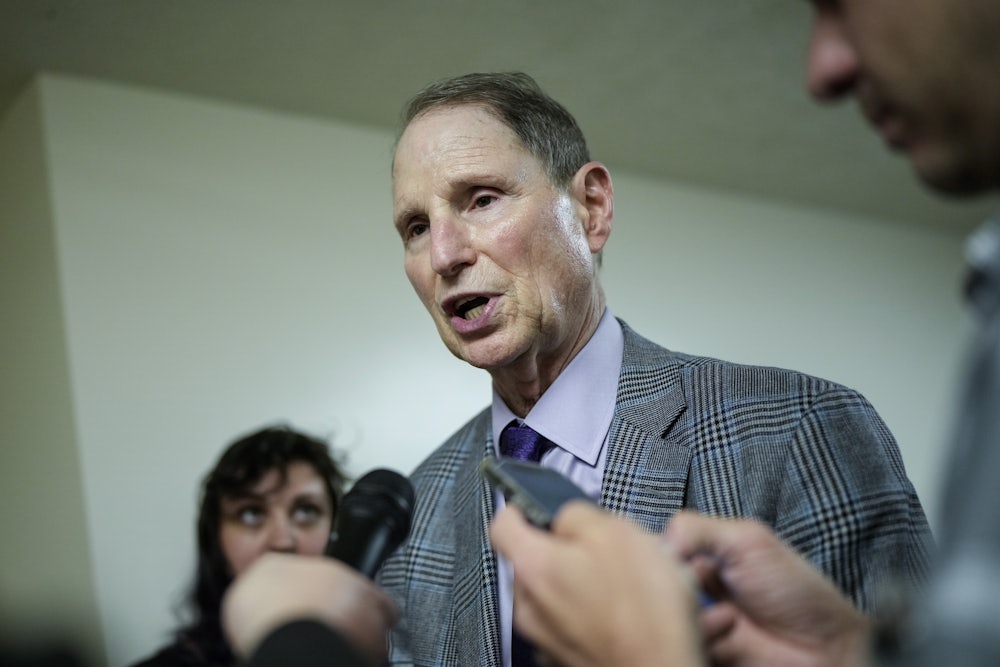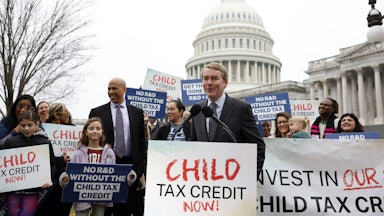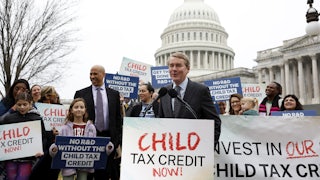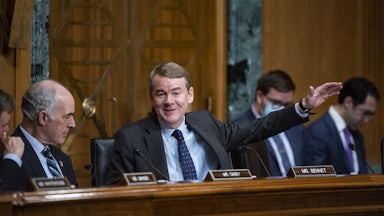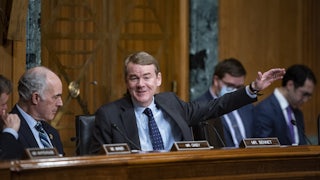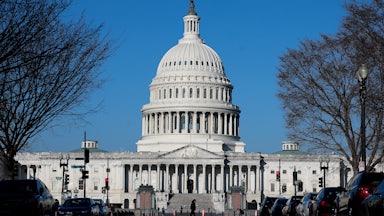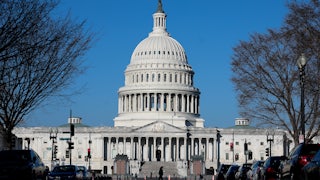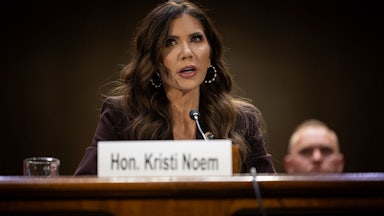Two years after the expiration of the expanded child tax credit, a pandemic-era policy that temporarily but dramatically lowered child poverty rates, federal lawmakers are close to a bipartisan deal that may reinstate some version of the credit.
Leaders of the tax-writing committees in the House and Senate are working on a deal to expand the existing child tax credit in exchange for extending certain business tax credits, including a popular credit related to research and development that expired at the end of 2022. Punchbowl News reported on Tuesday that the tax deal on the table may end up in the $50 to $80 billion range. A source familiar with negotiations told me that the leaders of the Senate Finance Committee and House Ways and Means Committee had not yet agreed to a final number, but that it would likely be a multiyear deal, rather than making the credits permanent.
But the road ahead is anything but smooth, as this potential deal arises during a particularly busy and politically fraught legislative period. With so many other pressing agenda items currently under consideration in Congress—such as keeping the government funded—it is unclear whether this tax deal will be approved in a timely manner.
Democrats have previously floated the idea of reinstating some version of the child tax credit that was temporarily expanded in 2021—and implementing it in concert with a credit related to business deductions for R&D expenses, a policy popular on both sides of the aisle. Senate Finance Committee Chair Ron Wyden, a Democrat, and House Ways and Means Committee Chair Jason Smith, a Republican, launched negotiations last year. Wyden and Smith spoke with Senate Finance Committee Ranking Member Mike Crapo about the proposal on Tuesday. The staff of the House Ways and Means Committee was also set to discuss the deal with Republican committee members on Wednesday.
“We’ve already, I think, prevailed on a crucial issue, which is that there’s going to be equal treatment with working families and business,” Wyden told reporters on Tuesday. “I want to get as much help as possible for these working families, and get as many families out of poverty as we possibly can. That’s what the objective is, is reducing child poverty in America.”
The version of the child tax credit agreed to in this potential deal will likely differ from the expansion implemented in the summer of 2021. That iteration of the credit was established by the American Rescue Plan Act, the nearly $2 trillion coronavirus relief legislation passed by Congress shortly after President Joe Biden took office. The expanded credit went into effect on July 15, 2021, with three fundamental changes to the preexisting policy. The amount of the credit increased to $3,000 for children between the ages of 6 and 18, and to $3,600 for children ages 5 and under, in households earning up to a certain threshold. It was also disbursed in monthly installments, rather than a lump sum issued during tax filing season—a move that helped poor Americans to address some of their most pressing financial needs, such as rent and food costs.
The most significant change to the credit, however, was a provision commonly known as “full refundability,” which allowed parents who owed little or no income tax to receive the credit. Prior to the American Rescue Plan Act, the child tax credit was not fully available for households that had no or extremely low income.
The full refundability provision was critical to the expanded credit’s success in lifting millions of children out of poverty. In December 2021, the final month that the credit was in effect, 3.7 million children were raised out of poverty; the following month, January 2022, that same number sank right back down. According to census data, child poverty more than doubled from 2021 to 2022, in large part due to the expiration of the enhanced credit. Had the credit been in place in 2022, it would have kept over five million children out of poverty and cut the child poverty rate nearly in half. (Still, although it reached millions of children in low-income households, not every eligible family received the credit, in part because they needed to register with the IRS to obtain it.)
“In the end, the part of it that’s most important to me is full refundability, to try to make sure that the poorest kids who’ve been excluded from the credit benefit,” said Senator Michael Bennet, who is an advocate for expanding the child tax credit but not directly involved in the current negotiations. “I think there have been some promising discussions about it. We’re going to have to see what the details are.”
The child tax credit has historically been a bipartisan priority. The 2017 Tax Cuts and Jobs Act, the massive tax package signed into law by President Donald Trump, increased the amount of the child tax credit from $1,000 per year to $2,000 annually, and increased the amount refundable per child, although it fell short of full refundability.
“The current law policy, which was created by Republicans in the 2017 tax law, is effectively 80 percent refundable—it’s $1,600 out of every $2,000 per child is refundable, whereas the Democratic policy is that all of it should be refundable,” said Andrew Lautz of the Bipartisan Policy Center. “It’s 80 percent versus 100 percent, not 0 percent versus 100 percent. And so, theoretically, that divide should not be difficult to bridge.”
It’s unclear whether Republicans would consent to full refundability, which would functionally eliminate the earnings requirement for the credit. “Some of the things they asked for, they want to go back to pandemic levels [of spending], for example, they want full refundability. Those are really hard issues, and you’re not going to get Republicans to agree to a lot of that,” Senator John Thune, the minority whip and a Republican member of the Senate Finance Committee, told me. “I think their asks have to be reasonable, and there’s going to have to be a good balance between what they’re requesting and what Republicans are going to need.”
Senator Thom Tillis, another GOP member of the Finance Committee, said that he believed Republicans and Democrats were still relatively far apart on the child tax credit. “There still seems to be a number of people on the other side of the aisle that believe the Covid-era policy should be codified. That’s just not going to happen,” said Tillis, echoing Thune. “Incidentally, even if there was support in the Senate, there’s no way that would pass the House.”
Democrats on the Finance Committee indicated that while they would prefer a return to full refundability, they accepted the reality of needing to find a compromise. “I want to get whatever we can get. And we’re going to drive as hard a bargain as we can,” said Senator Sherrod Brown, a Democrat who has worked to expand the child tax credit, although he is not directly involved in current negotiations.
Others were more skeptical. Representative Rosa DeLauro, who has advocated for an expanded child tax credit for several years, argued that the American Rescue Plan version was “our most effective tool in the fight against rising costs.”
“I am concerned about the deal that is being negotiated, and am skeptical that any changes were necessary to improve the quantifiably successful child tax credit expansion that was included under the American Rescue Plan,” DeLauro said in a statement. “I believe that we need to extend that expanded, monthly child tax Credit as we knew it. I strongly believe anything less will fail to meet the moment.”
Still, such a deal would also be a victory for Republicans; although the R&D credit is popular across the aisle, the business credits as a whole are particular priorities for the GOP. The 2017 tax law had included a provision requiring businesses to expense their R&D investments over five or 15 years, instead of immediately writing off the full amount. This policy, which began in 2022, has been universally loathed by the business community; CFOs and the U.S. Chamber of Commerce are among those who have urged Congress to reinstate the ability to deduct R&D expenses annually.
The deal would also likely bring back lapsed benefits for businesses deducting interest expenses and asset purchases. Beyond being a key Republican policy priority, approving business credits might be politically helpful for Johnson, the newly minted speaker, as a way to prove to the business community that he takes their concerns seriously.
However, even if Democrats and Republicans were to reach an agreement, its future in Congress would be uncertain—in part because it may not include revenue raisers to accompany the tax cuts. Of course, supporters of both the child tax credit and business credits can argue that these policies will help the economy in the long term, but the cost may make some fiscal conservatives queasy. The Committee for a Responsible Federal Budget estimated in December that, if made permanent, the policies under consideration could cost $830 billion over the next 10 years, with the business credits amounting for the majority of that cost.
Just as pressing as the price tag is the functional question of procedure; not whether it can pass in Congress but how soon. Americans often begin the process of filing their taxes in January. If members of Congress want to pass legislation that expands the child tax credit retroactively—making it possible for parents to claim this year—they will need to do so quickly. Wyden told reporters on Tuesday that his goal was to finalize the legislation by January 29, when tax filing season formally kicks off.
Crapo, the ranking member of the Finance Committee, indicated that he believed the conversations were serious. “I wouldn’t be working on it if it couldn’t become law,” he told HuffPost’s Arthur Delaney on Tuesday. “We have to put together a bipartisan, bicameral agreement that will be able to not only survive a filibuster, but survive the dynamics in the House.”
Those dynamics can be complicated; Johnson is already facing pressure from his right flank on issues of government funding and immigration policy. Moreover, Smith’s committee is one of three spearheading the impeachment inquiry into President Joe Biden, although Wyden said that Smith’s role in those investigations has not factored into their negotiations on a tax deal.
There is also the question of attaching the tax deal to a plausible legislative vehicle to allow for its quick passage. Funding for four government agencies expires on January 19, with the remaining eight funded through February 2. Although Johnson and Senate Majority Leader Chuck Schumer agreed to a funding deal over the weekend, there is very little time to pass such massive spending legislation. Indeed, Senate Minority Leader Mitch McConnell said on Tuesday that Congress would need to pass a short-term continuing resolution to keep the government funded temporarily.
Moreover, Johnson will likely face revolt from some of the more hard-line conservative members of the House angry that the spending deal matches the agreement reached by former Speaker Kevin McCarthy and Biden last spring. In theory, a tax deal including an expanded child tax credit and extended business credits could be added to such spending legislation; however, it’s uncertain whether such an addition would help or hinder the overall goal of averting a government shutdown. (Johnson had also painted himself into a corner by saying last year that he would not support another short-term continuing resolution.)
When asked about a potential vehicle for a tax deal, Wyden compared the situation to the movie Field of Dreams. “If you build it, then everybody’s gonna show up,” he said, echoing the film’s famous tagline. “That’s not exactly how the Congress of the United States works, but we’re generating a lot of support right now.”
